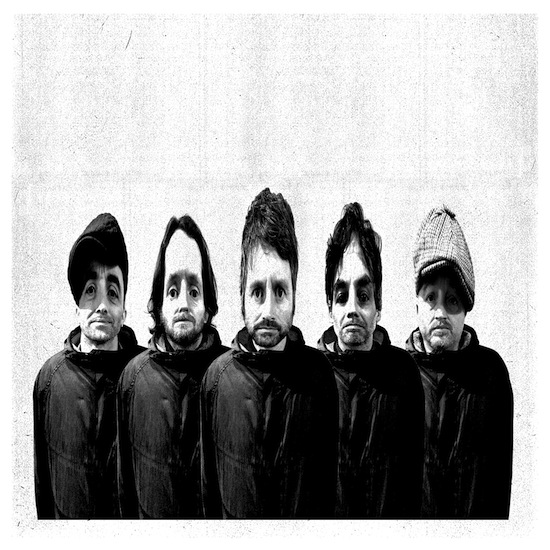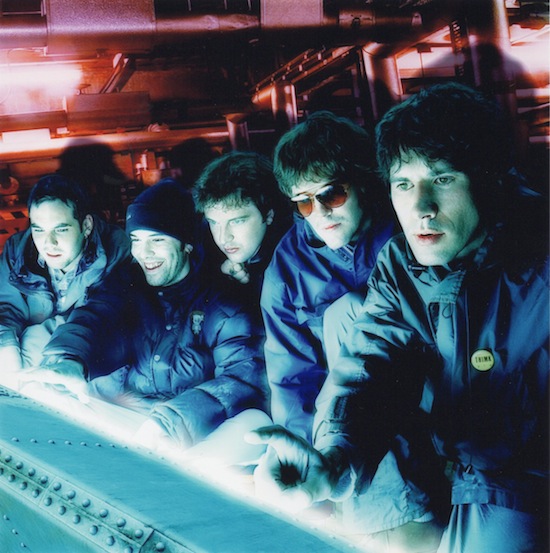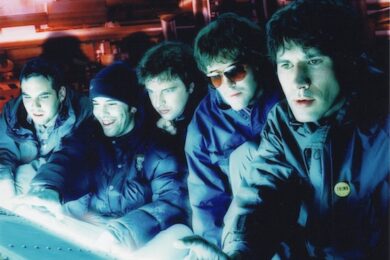Sound the Alpine horns! The most cosmic band to claw their way out of both Britpop and Cardiff are back. Super Furry Animals are about to perform their first gigs in five years, including a headline slot at this year’s Green Man Festival, and they’re re-releasing their dream-pop glam-spaghetti-western fourth LP from 2000, Mwng, through Domino Records.
It was the first and only album SFA recorded entirely in their native Welsh – something that caused the learned critic of The Jewish Chronicle to label the album "career suicide". Perhaps it’s apt that such a majestic album was met with confusion – despite the critical shoulder-shrugs, no other band at the time, when Noel Gallagher’s invites to Downing Street had started to go astray in the post, would’ve been mentioned in Parliament. (SFA were for drawing attention to the cultural significance of the Welsh language.) Not that the band remember much about it. Mwng remains a treasure, dislocated from anything else in their back catalogue.
tQ met with singer Gruff Rhys and guitarist Huw ‘Bunf’ Bunford in a hotel bar opposite Broadcasting House to reminisce about an album they barely recall recording, the demise of Creation Records and their mysterious short-lived, oft-discussed alter-ego band, Das Koolies. Oh, and republicans take note – your campaign to unearth Das Koolies’ ‘vaporised’ song about Princess Diana starts now.
How did the conversation about reissuing Mwng start?
Gruff Rhys: It’s a conversation that’s been going on for three or four years. We forgot on the 10th anniversary, and then around the 12th anniversary we started talking about reissuing it because it wasn’t available. We heard that Domino were fans of the record and it turned out that they were. We weren’t in any hurry, so we forgot about it, and then we ran into them again, and they were like, "Weren’t we talking about reissuing Mwng a couple of years ago?"
It took about a year to arrange it. I’m really happy it’s coming out. Although the 15th anniversary isn’t a particularly famous anniversary. For anything.
Do you remember the recording being a positive time? Are you nostalgic about it?
GR: It feels very recent, still almost in the moment. We recorded it so quickly that it’s not a long memory. We spent a weekend in Cardiff recording and a week in North Wales. And that was it. Took about two weeks. A two-week-sized memory from 15 years ago.
I realise now that I’ve asked you for something quite specific there.
GR: Yeah! We were reacting against a couple of records where we’d spent months and months in the studio, pushing multitrack technology as far as we could go…
[Bunf arrives. A heartfelt hug is exchanged between bandmates.]
Huw Bunford: It’s difficult to know what sort of mindset we were in at that point. All I know is we’d been touring loads and we seemed quite tight. We wouldn’t have been able to do it in two weeks otherwise. Maybe it was just a relief to be in one place for more than a week… There’s some cobwebs there. I’m desperately trying to brush them away. It was in a very small studio…
GR: It was called Famous Studios. The first time went there we were looking everywhere for it, so we went next door and asked "Is this Famous Studios?" And nobody knew where it was. The Manic Street Preachers have bought it since then, and now it’s called Faster. It’s a good-sounding place. We were there for a weekend and then we went to Gorwel Owen’s place for five days or something.
HB: I can’t even remember going to Gorwel’s. Was I there?
GR: Yeah, I think we put drums in the live room and guitars in the kitchen…
HB: Oh yeah… In Gorwel’s it was all about finding little nooks and crannies for your own little set-up. Gruff had lots of Welsh songs, like a back-catalogue of Welsh songs that were burning a hole in his… song-book?
Guitar case?
HB: Yeah, guitar case.

Band portrait by Mark James
Had Creation Records already folded by this point?
GR: No. They were excited to release Mwng and they had no expectations for it. By then, they were used to us. I think they trusted us to do what we wanted.
They were probably relieved you were thinking of doing something a bit cheaper.
GR: [Ruefully] Yeah…
HB: They got to that point where they said, ‘Just let them do it.’ If we were enthusiastic about it then it was good enough for them. I don’t know what happened. It all got a bit… they were positive at the beginning. Optimistic.
GR: Then they split up as a label, but the record was done by then. We took the record ourselves.
I’m hoping this quote is accurate, but around the time of release The Jewish Chronicle called Mwng ‘career suicide’.
GR: We were in charge of marketing our own record for the first time, so we found a load of quotes that were more negative and put them together for the adverts.
HB: ‘Career suicide’ was one of nicer ones.
GR: The review itself was good. We fished out various horrified quotes. It’s anti-advertising, but it worked. The records flew off the shelves.
HB: [laughs wildly]
But in a way, they were right to call it career suicide, because releasing an album of Welsh-language songs back then seemed like an insane move, more than just whimsy. Did it feel like that at the time?
GR: No. It came on the back of three extremely hyped English-language albums. We had an audience that was used to us, and the music itself isn’t alien. It’s Westernised guitar pop, so it’s understandable for people from that world. It just happened to be in our first language.
HB: It was never really a thought-out career. We didn’t have conversations with any svengalis.
Prior to Mwng, though, you had that spliff-rolling merry prankster image, like it or not. Then this album mellowed everything.
HB: The mellow thing, definitely. Especially on some of the live sessions on the reissue. You had the English songs which were quite bombastic and gung-ho, then this was really mellow and psychedelic. It probably just threw a lot of people in a really good way. We played it in America very early on and that’s the only time they actually got us.
In that time, all I can remember the press saying is ‘This is the new British invasion! The new British band that’s going to invade!’ It was so militaristic. Then we came along with something that’s…
Not the sound of an invasion?
HB: Yeah. It was more like a sound that got lost. Like someone who’s landed in America and don’t know where they are. For a lot of the time they had Union Jacks next to our name when we were advertised anywhere outside Britain.
The Welsh language has been a focus of yours, Gruff, for the last few years as you’ve found out more about its dwindling status in your American Interior documentary. What’s the future looking like?
GR: Unfortunately it’s still very much in crisis. In the census shortly after Mwng was released, there was some excitement because it seemed the decline flattened out. The 2011 census then showed that percentages were going down again and the Welsh language effectively became a rural language. There are areas where it’s always been taken for granted that Welsh would be the majority language which, in the last census, went under 50% in a lot of those areas for the first time. Any increase in language was due to education in urban areas, so it wasn’t necessary a language spoken day-to-day.
The song ‘Pan Ddawr Wawr’ on Mwng deals with that a little bit, the rural brain-drain. House prices are shooting up, people can’t afford to buy houses so people move to the cities… it happens all over the world. It’s partly down to the politics, it’s not there to legislate. In terms of Welsh as a pop language, it’s still really strong. There’s still really great records coming out in the Welsh language. In that sense there’s an optimistic note.
HB: I live in London and I go back sometimes, and there’s a lot of Welsh-language radio. From what I remember from years ago, it’s even more diverse and experimental. It seems to have a life of its own. You hear the artists and they’re really confident, much more than we were.
You mentioned earlier that there’s a bit of a backlog of songs from that period. Do you have Prince-style vault of unreleased material that you’re sitting on?
GR: We’ve got a load of stuff. There’s definitely unreleased songs, unreleased experimental albums.
HB: There’s the [Princess] Diana song.
GR: Yeah, there are songs that are so outrageous they’d be career suicide. There’s albums we’ve lost, but they weren’t particularly good. Just a lost album, not a great lost album. What was it, Steelworks In Stone?
HB: That’s right. When we were recording Guerrilla, it was such an overly ostentatious studio, ironically called The Real World. You had so much room. [keyboard/electronics man] Cian started getting bored, I think. There was a lot of waiting around and dissecting, so we ended up starting a parallel band called Das Koolies. We all took on different characters. I think the Stereophonics were next door and they came in to see what we were doing, so we exposed them to Das Koolies. Their late drummer, he was quite taken aback. He said to concentrate on what we were doing.
GR: We took his advice. That was the year before Mwng. We wanted to retreat from polished pop, I think.
HB: We hired some steel drums for one little bit in a song, so we felt like we wanted to use them. They were one of the main instruments in Das Koolies. That and the Taurus bass.
GR: Are you familiar with the Moog Taurus? It’s a synthesiser you play with your feet. It makes some howling noises.
HB: Those two instruments were very much the meat and potatoes of Das Koolies.
[Note: a quick Google of ‘Das Koolies’ brings up this intriguing business listing, established in January 2015.]
So what was the Diana song?
HB: [suddenly edgy] No, no. That was…
GR: Vaporised.
HB: Too much wine. It’s still good.
GR: Though never released.
HB: When all the hoopla dies down, maybe. It does sound a bit like Elton John, though.
Now that you’re all back on board with SFA after various solo projects and five years off, are you finding it hard to be a band again?
GR: No. We haven’t played live together, but we mimed together [for a Gary Speed memorial show in 2012]. It came back really easily.
HB: I think once you can mime you can do anything.
One of the original titles for Rings Around The World was Text Messaging Is Destroying The Pub Quiz As We Know It. But only a couple of years after that album was released it became clear that the real menace was internet-enabled smartphones. Bullet dodged?
GR: That’s the danger of technology and perhaps why some records date by using the cutting edge. One of the good things about Mwng is that it’s hard to place when you listen to it. It’s not particularly trying to use the latest recording technology, it’s more about the songs and it’s very simple.
HB: It’s a weird one. All our albums do sound quite different. It’s more to do with the devil in the detail.
GR: We reacted against Mwng by doing an album in surround sound with loads of autotune.
I remember seeing SFA in the Southampton Guildhall when you were touring Phantom Power, and there was a surround sound effect of a galloping horse, which the entire room was confused by and turned around on the spot.
GR: Ha! We had Alpine horns, too. We had a man and a woman miming on Alpine horns. It looked pretty cool. The audience… well, I’ve no idea how we came across.
HB: Sometimes you don’t want to dwell on it.
So when you tour this summer, is it a full-steam SFA show with huge production values?
GR: Yeah, we wouldn’t do it half-arsed. We’re working with a sound engineer who specialises in sub-bass. So I imagine there will be lots of sub-bass and extreme feedback and distortion. And strobes, and a brass section. No Alpine horns. We’re not going to revive anything in particular from the past… [there’s a characteristically portentous pause] but it’ll be very intense.



